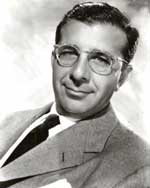

| Barney Balaban | Louis B. Mayer |
| James F. Byrnes | Dore Schary |
| Harry Cohn | "General" Nicholas Schenck |
| William Goetz | Mendel Silberberg |
| Samuel Goldwyn | Spyros Skouras |
| Eric Johnston | "Major" Albert Warner |

Dore Schary was the only participant in the Waldorf Conference who ever wrote about it publicly. A true progressive and a fair man, it tormented him until the end of his days that he wound up being the person who articulated the "Peace Pact" that was used to spark the Hollywood Blacklist.
Born in New Jersey and not educated past high school (though most people in Hollywood thought him a credentialed academic), he flirted with acting before settling in as a writer. In his early days he wrote the original story for MGM's "Boys' Town" which won him an Oscar® and the respect of studio chief Louis B. Mayer. The respect was for more than Schary's gifts; it was because Mayer sought to position Schary as his personally chosen successor to Irving G. Thalberg, and use him as a wedge against Nicholas Schenck, the head of Loew's, Incorporated, which was MGM's parent company.
Schary took over MGM's "B" picture unit and supervised dozens of low-budget, but highly profitable, features before being hired away to run RKO Radio Pictures. It was as RKO's production chief that he participated in the Waldorf conference.
His recollections of the meeting are contained in his autobiography, Heyday ( Boston, MA: Little Brown, 1979). They include his notations that Eric Johnson talked to the people in the room "as if we were members of an industry manufacturing secret deadly weapons by employing Communists" and that Sam Goldwyn pulled him aside to suggest that there was an air of panic in the room. Goldwyn, Schary wrote, "spoke sarcastically and irritated Johnston, who responded with an angry speech concluding with the cliche asking whether we were mice or men. He insisted that if the motion picture business wanted to earn the respect of the American public, the Ten had to be discharged." When it came time to write a press statement announcing the firing of the Hollywood Ten, Schary at first refused, but gave in after Goldwyn leaned over and whispered to him, "Do it -- maybe they won't go crazy."
Added Schary to Nancy Lynn Schwartz in The Hollywood Writers' Wars, "Eric Johnston was of no help. Goldwyn, [Walter] Wanger and I were angry at the Waldorf meeting. We proposed to the producers that they organize a council to protect people who were unfairly accused. The position was just terrible." Schwartz notes that Schary "is a man so anxious he sometimes had to wear cotton gloves to cover the nervous rashes on his hands." Lillian Hellman asserts in Scoundrel Time that Goldwyn's opposition to the Peace Pact was not so much a vote for freedom as the fact that "he always voted against any group decision."